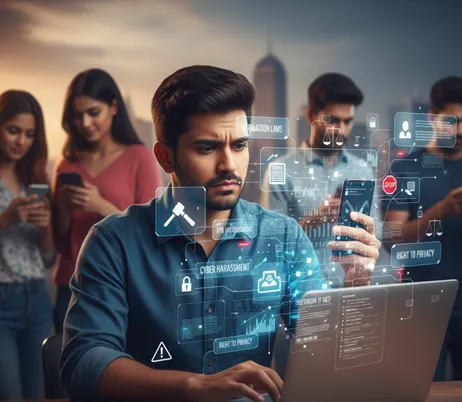
Posting, sharing, or publishing content online—on Instagram, YouTube, X (Twitter), Facebook, blogs, or WhatsApp—carries legal responsibility. Certain content may lead to civil or criminal consequences, including international liability in severe cases.
Key Legal Concerns for Online Content
Your online content may be subject to legal action if it is:
- False or misleading
- Defamatory (harms someone's reputation)
- Obscene or vulgar
- Communal or hateful
- Copyright-infringing
- Incites violence or unrest
Applicable Laws
- Bharatiya Nyaya Sanhita (BNS, 2023): Defamation, obscenity, incitement, hate speech
- IT Act, 2000: Sections 66, 67, 79 (cyber offenses, obscenity, intermediary liability)
- Copyright Act, 1957
- Consumer Protection (E-Commerce) Rules, 2020 – disclosure for ads/promotions
- IT (Intermediary Guidelines and Digital Media Ethics Code) Rules, 2021
State-Wise Cyber Legal & Complaint Portals
| State/UT | Portal / Contact |
|---|---|
| All India | Cyber Crime Reporting Portal |
| Delhi | Delhi Police Cyber Cell |
| Maharashtra | Mumbai Cyber Crime |
| Karnataka | Karnataka Cyber Crime |
| Tamil Nadu | TN Cyber Crime |
| Uttar Pradesh | UP Cyber Crime |
These portals allow online complaints, reporting of cyber crimes, and grievances related to online content.
FAQs – Online Content & Creator Liability
-
1. Can I be punished for making a meme insulting a public figure?
-
Yes, if the meme is defamatory, false, or incites hatred.
-
2. Are readers responsible if they share fake news unknowingly?
-
Mostly no, but repeated or deliberate sharing can lead to warnings or legal notices.
-
3. Is using copyrighted music in my reel illegal?
-
Yes, unless it is licensed or royalty-free. Copyright violations are punishable.
-
4. Can I post honest negative product reviews?
-
Yes, but false statements or deliberate misinformation can lead to defamation claims.
-
5. Maximum penalty for obscene or vulgar postings?
-
Up to 3 years imprisonment and fines under IT Act Section 67.
-
6. Are influencers liable for misleading ads?
-
Yes. Full disclosure (#ad) is required under Consumer Protection Rules.
-
7. Can I use clips from other creators for commentary or parody?
-
Yes, but fair use, proper attribution, and compliance with copyright rules are required.
-
8. Are there laws specific to bloggers or YouTubers?
-
Yes. Compliance with IT Rules, copyright laws, and anti-defamation laws is mandatory.
-
9. Am I responsible for hate comments on my posts?
-
Yes. You must delete or report them if notified.
-
10. Can police block my account or content?
-
Yes, under court orders or IT Rules, content may be removed.
-
11. Am I liable for AI-generated misleading content?
-
Yes, if it misleads people or causes harm.
-
12. Can parents be held accountable for their minor children?
-
Yes, in serious cases involving violence, porn, or hate content.
-
13. What if my content incites riots domestically or internationally?
-
You may face charges for incitement, promoting enmity, or public disorder.
-
14. Can foreigners sue me for content posted in India?
-
Yes, in serious cross-border defamation, copyright, or privacy cases.
-
15. Does deleting harmful content remove liability?
-
No. Deletion may reduce damage but does not cancel legal responsibility.
-
16. What content is completely illegal?
-
Child pornography, hate speech, fake news, revenge porn, threats, religious insults, etc.
-
17. Should I register as an influencer with the government?
-
Not mandatory yet, but compliance with ad disclosure rules is required.
-
18. Can I face jail for posts or tweets?
-
Yes, if your content involves threats, criminal exposure, defamation, obscenity, or hate speech.
-
19. How can content creators protect themselves legally?
-
- Use disclaimers
- Avoid illegal content
- Obtain copyright permissions
- Keep records and proof of sources
-
20. Is sharing private chats or photographs illegal?
-
Yes. Privacy breaches can lead to imprisonment under IT Act and BNS.
Add new comment